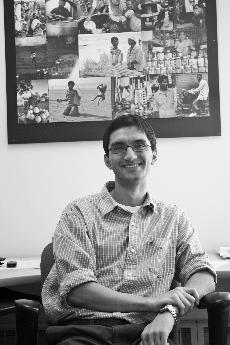
(Oren Jacobson)
Originally from Mumbai, India, Ameya Balsekar has been an assistant professor of government at Lawrence University for just over a year. He attended Brown University for his bachelor’s degree and earned his doctorate at Cornell University. Balsekar specializes in the sub-field of comparative politics, with a focus on India. Maccoux: In general, what makes Lawrence University special to you?
Balsekar: There is a lot to like. I really like that there are a lot of opportunities to interact with faculty across the disciplines. There are schools where moving outside your department or field is pretty rare. Also, speaking as a relatively new member of the faculty, there’s something about the feel of the school – the environment, maybe – that is very nurturing.
Maccoux: Why did you decide to study in the United States?
Balsekar: I did one year of college back home, starting off as a biology major, actually. I realized that the reason I decided to study biology was because my friends were studying science too, but I hated the straitjacketed education system back home. While I was going through all of this, I had a friend who had gone to boarding school in the states, and he was applying to colleges. He suggested I apply to schools here too, and I did. For me, it was either dropping out or starting fresh. It was all very spontaneous and unplanned, but it seems to have worked out okay.
Maccoux: With that in mind, what advice would you have for undecided students?
Balsekar: Yikes! I’m not sure I should be dispensing life advice… Go with your gut. We all have a sort of gut feeling about what we enjoy. Go with what you enjoy doing, because if you enjoy it, you will do it well. I like to believe that if you do something well, your abilities will be recognized.
Maccoux: So what eventually got you interested in government?
Balsekar: When I came to the U.S., I pretty much went wild, and it was only in my junior year that I eventually settled on development studies. For that major, which was multi-disciplinary, I wrote a senior thesis on environmental policy in India. While writing it up, I realized that politics seemed to matter more than the quality of policy. So when I decided to apply to grad schools, political science seemed like a better choice. I had taken maybe two political science courses as an undergrad, so it was pretty tough, but everything worked out okay.
Maccoux: What made you decide to become a teacher?
Balsekar: I think at some level, I always wanted to teach. It helped that I had teachers that I really loved in school as a kid and then in college. My mom is a teacher, and my sister is one of those multi-skilled individuals who also teaches, so we have a lot of educationally-inclined people in my family. Also, when I started teaching in grad school, I really enjoyed it. It really made me happy. That kind of satisfaction, I knew I couldn’t get in a cubicle.
Maccoux: What are the greatest and hardest parts of your job as a professor?
Balsekar: The greatest benefit is that I get almost three months a year to go back to India and spend time with my family. I wouldn’t be able to have a job like this back home. So, it works pretty well because I get the best of both worlds. That for me is a big plus. I love the fact that teaching is a very intellectually stimulating profession. Things that I may have thought about for years in one way, I find a student thinking about in a completely different way. I find that really rewarding. I don’t know if it’s because I’m still relatively new to teaching, but grading is really difficult. I still occasionally have problems with grade guilt, and it’s a constant challenge to ensure fairness and consistency across 20 or 30 papers.
Maccoux: What is your favorite course to teach?
Balsekar: I don’t think I have a favorite yet, but there are always topics I enjoy discussing in all of my classes. I love talking about censorship because it’s part of my research and, generally, the politics of culture.
Maccoux: Outside of the classroom, what are some of your favorite activities?
Balsekar: I’m a food fiend, and I enjoy a good meal out with good company. Good food, good company and movies. I’m a huge movie fan. I’ve been told by friends that my taste in movies and music is like a 70-year-old’s. I think that may be partly true…
Maccoux: Well, what would you say is your favorite movie?
Balsekar: I’d say that “Forrest Gump” is my number one, and “The Shawshank Redemption.” They tie for first. I’ll leave my more embarrassing favorites out…
Maccoux: Since you are a government professor, I have to ask: What did you think of the mid-term elections?
Balsekar: I’m not very familiar with American politics but, like everyone else, I can’t say I was entirely surprised by the outcome. Because of the way I think about politics, I almost expected some disaffection after a wave like the one that won Obama the Presidency. I was surprised that Feingold lost, given that he was, from what I understand, a very independent-minded Democrat. It made me wonder what exactly voters were basing their decisions on.
